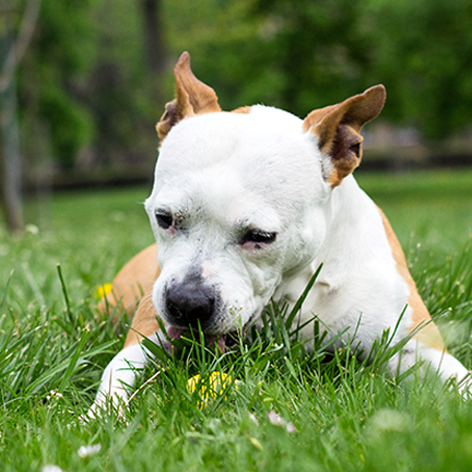Why do dogs eat grass?

Dogs eating grass is a relatively common behaviour, and there are several possible reasons why they engage in this behaviour:
- Dietary supplement: Grass contains certain nutrients, such as fiber, that may be lacking in a dog's regular diet. Eating grass could be a way for dogs to supplement their nutritional needs. However, it's important to note that most commercial dog foods are formulated to provide a balanced diet, so this behaviour is not necessarily an indication of a nutritional deficiency.
- Upset stomach or digestive issues: Dogs may eat grass as a way to soothe an upset stomach or alleviate digestive discomfort. Grass can help induce vomiting, which may be beneficial if a dog has ingested something that is causing gastrointestinal distress. Some dogs may instinctively turn to grass to relieve symptoms of indigestion or to promote bowel movements.
- Boredom or behavioural habit: Dogs may eat grass out of boredom or as a behavioural habit. If a dog is not getting enough mental or physical stimulation, they may resort to eating grass as a form of entertainment or to occupy their time. In some cases, it becomes a learned behaviour that dogs engage in simply because they've done it before and found it to be satisfying in some way.
- Natural instinct: Dogs are descended from wolves, who were omnivorous and consumed plant matter as part of their diet. It's possible that the behaviour of eating grass has been passed down through generations as an instinctual behaviour.
- Palatability or taste: Some dogs simply enjoy the taste or texture of grass. They may find it appealing and choose to eat it for sensory reasons. However, this is likely a less common reason compared to the other factors mentioned.
While eating grass is generally considered harmless, it's important to monitor your dog's behaviour and ensure they are not ingesting any toxic plants or chemicals that may be present on the grass. If your dog frequently eats grass and exhibits signs of gastrointestinal distress, it's best to consult with a veterinarian to rule out any underlying health issues.

